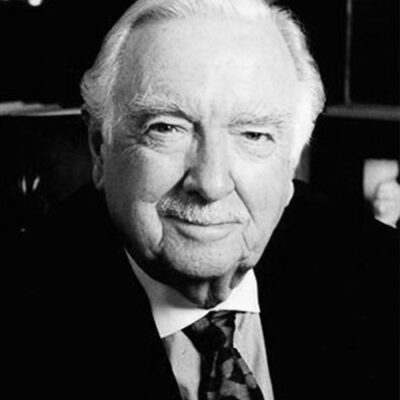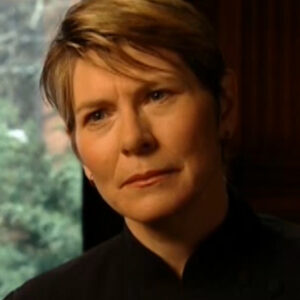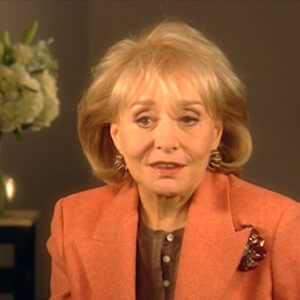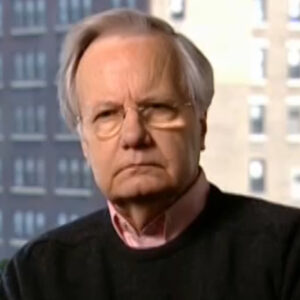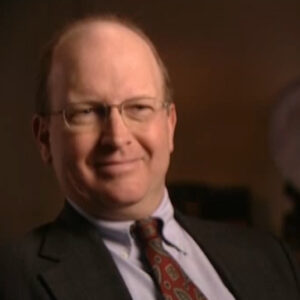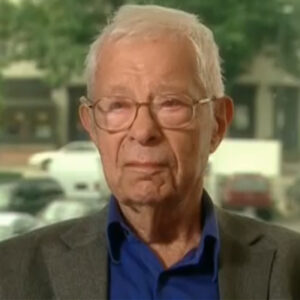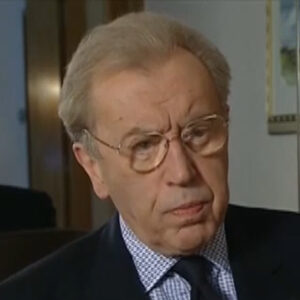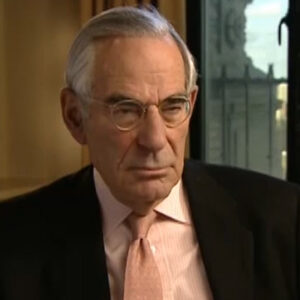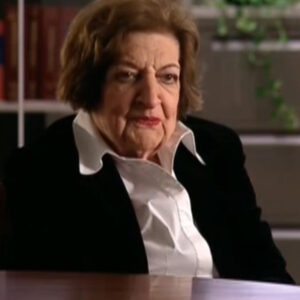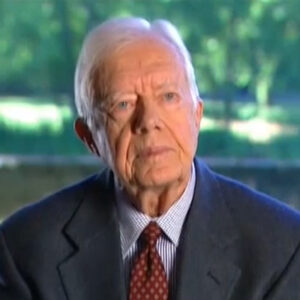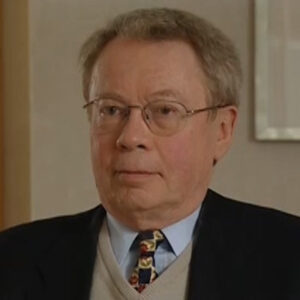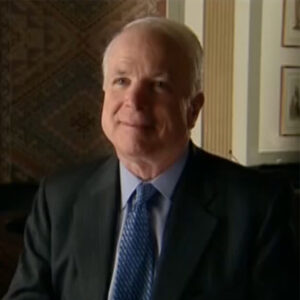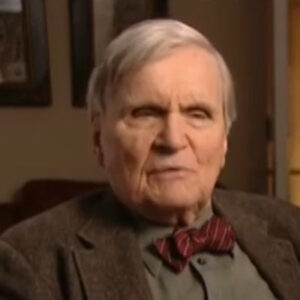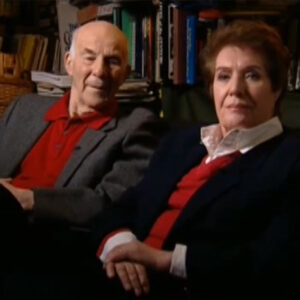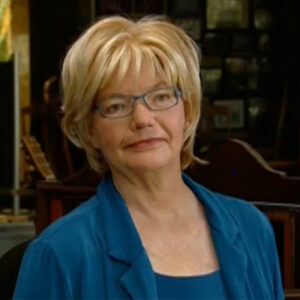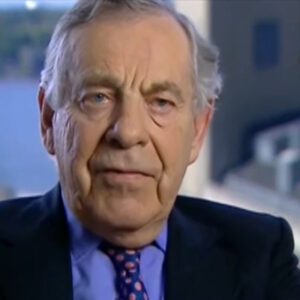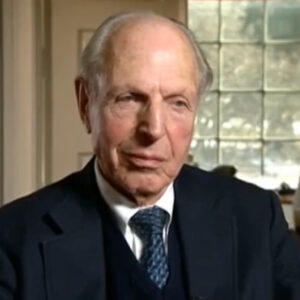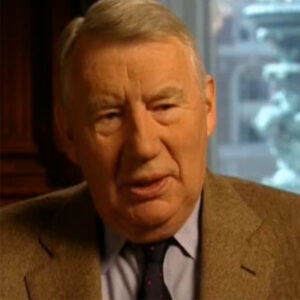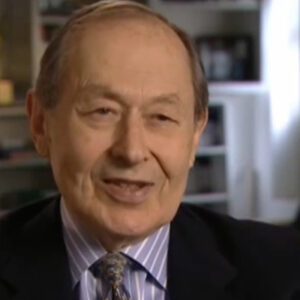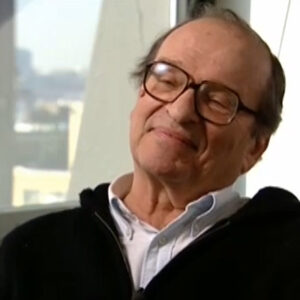Speaker Yes, definitely. It can hold. And you’ve got a great face.
Speaker He’s heard it before. Eighty four years of it. I’ve had. How many? Eighty four. Wow. Don’t look at people. I can fool people, but it doesn’t change the fact.
Speaker OK. So, yes. OK, so my first question is to ask you.
Speaker When was the first time you met Walter and what were the circumstances and what were your memories of your meeting?
Speaker Yes, Carol. Yes.
Speaker I can’t remember exactly when I first met him. I had I was close to some of the most of the CBS people dating way back in Europe. But Cronkite was the big cheese around here long before, I mean, I had any important job at all. So that he was. He was. You know, he was kind of a father figure to us all and very much the top of his profession. So I can I can remember it was probably when Blair Clarke was head of CBS News, and that probably was in the 60s.
Speaker Can’t be that far. I’m really quite guessing.
Speaker And but.
Speaker Began to see him around here, and then I saw him one summer up in Martha’s Vineyard, I think, and.
Speaker What were your impressions?
Speaker Well, he was he was the he was the he was the leader of the of the television correspondents. He had he had the respect. He had the clout. And my my feeling about him was I was lucky to know him.
Speaker And and.
Speaker Work with him, as I learned a little about television and now you.
Speaker Were you aware of him when he was during when he was with you before he even started? Was he known even before he got into television?
Speaker Not by me. Not by me. I didn’t know him before that. But but, you know, I disappeared from Washington in the 50s, early 50s. I went to Europe to be the first. The cast. The press attache in the embassy and then Newsweek’s correspondent in Europe. So I didn’t get back here till eighty seven or something like that. 88.
Speaker As a journalist, what’s what are the qualities that you feel Walter has? I mean, that’s what makes him stand out.
Speaker Well, above all, he stood out for his authority. He just. If Cronkite said it. It had a different aura about it than just any guy yakking away at a microphone. This CBS News crowd was who were the standouts? There’s no no other way of saying it. NBC had Huntley and Brinkley, but and they were very important. But especially David Brinkley. But I mean, Walter was senior to David and then been added and I guess longer, I don’t know, David had been added forever to. We don’t have that kind of consistency anymore these days.
Speaker But but I mean, when you say I mean, what what qualities? I mean, why was he so believable? What made him so believable?
Speaker Well, I don’t know how television. People get authority. I mean, you’d think that exposure alone would do it, but exposure alone doesn’t do it. There are too many talking faces now. And so I think he had as sort of a fatherly image even when he was and as old as he became. And the other the other correspondent, with Brinkley, said an exception. They were both very distinctive. And I think that’s the thing, that the medium was so strong. And it’s that was in when the height of television news. I mean, television news like newspaper circulation has declined in an audience over the years. And that’s because people got used to it. And there are so many of them. But remember, Walter stood out. And Walter Brinkley.
Speaker Yes.
Speaker Last anchor people who started in print. And do you feel. Have we lost something by losing the connection to print journalism? Do you think that the quality of reporting has changed from when Walter was on because he came from the wire, came from the.
Speaker You paid? Yeah, he. Tell me a little bit about what you think about.
Speaker Well, I have sort of a nostalgia about that. That it may not be. It may not be as relevant, but I think it is it gave the the television people that came up having been writers first place, they express themselves for a thoughtfully as well as, you know, as with Polish. But.
Speaker I think that the correspondents and the radio, the TV correspondents that had I think they all started in the press. They had to. That was the only source of supply of people who could who had any familiarity with the news. But you had to have more than that. You had to I mean, I think a lot of guys went on television and were knowledgeable, but they didn’t have the, you know, the style and the.
Speaker Sort of. Style, really, of authority. Mixed it.
Speaker Walter was proud of the last anchor he started. I mean, I just feel like I wanted to get a little more sense that.
Speaker You when you say that he was unique. I mean something that stood out. Do you think that part of that was the fact that he came out of the rupee, that he sort of that pressure and having to get the story and knowing how to be able to get the story quickly and report it quickly? Do you think that that had anything to do with what made him?
Speaker I’m sure that that is that was the if it was maybe the only true. It provided the only pool for the first television correspondents. The press did. But I think that it also gave them a kind of confidence in their judgment that showed. I’m not sure that that’s still true. I mean, I think they led. I mean, they led the way. But the way became it became excellence in television and rather than excellence in news reporting. I think most of us who know much about it. You know, separate the two functions, one, but the reader, the person who reads the news and the other who really reports it and writes it. And I think. I don’t know enough not knowing enough about the business to know which one of them do it the most, certainly they all did an awful lot of reporting in the beginning. Whether they do now or not, I’m not sure. Now, they had clout with a new medium, was so exciting to the day that the newsmakers that if you showed up with with a whole lot of paraphernalia and a camera and these guys, you know, got ready to go.
Speaker Now, did you notice a difference in terms of when CBS was under the leadership of Murrow and.
Speaker And Fred, friendly versus under, you know, when Cronkite sort of was in his heyday, was there. Do you feel like there was a difference in town or or atmosphere?
Speaker I can remember, I don’t remember. I think when when? There was there must have been a period where television news sort of settle down and get comfortable with itself, and you lost the feeling that this was this was a new media and it was also exciting. And it had all this paraphernalia with it and it became much more natural. And we began to live with it in our in our lives. And and to those of us who are in the business, you began to get accustomed to not only that presence, but their prominence.
Speaker And, you know, the TV cameramen started at a big press conference would always sort of sneer at you.
Speaker Here come the reporters, you know, and as if they were we were all essentially second rate. And I think a lot of them thought that. I don’t think the reporters thought it so much, but.
Speaker That’s interesting. How did you feel that television changed the stories that it covered? For example, starting with the conventions.
Speaker Oh, on television. It ruined a lot of good stories because it was it was such an overwhelming presence that they became the story. I mean, those conventions when. Who the hell was it was carried out? Was it Dan? You know, our chancellor rose herself. Yeah. I mean, they became the story and and they covered it, you know, that they had an immediate see to it that all of the televisions advantages when you when you could get Mayor Daley at a Chicago convention shouting obscenities and the television camera was looked as if it was five feet away from him. And reporters had to wait and report that.
Speaker And.
Speaker Television had the immediacy that it has. I mean, it changed. It certainly changed. It revolutionized journalism. Editors began making decisions after television on the understanding that most of their audience knew the grand outlines of a story. And therefore, the most important thing that they could do would be not only the lead. One hundred words, which was probably 150 words, was the average television story.
Speaker We had to fill in the chinks. And. That was such a revolutionary change. So you felt that it really undercut his newspaper?
Speaker Well, I think it think before we got comfortable with it, I think that the press felt that they were being undercut. But the fact is that they probably increased the the knowledge of the people who read newspapers and therefore the media. It improved the it improved the audience. Everything on in a newspaper. Prior to television was exclusive. I mean, nobody else had it because it was that nobody listened. Right. Well, you listen to radio news. But you weren’t taking notes in any sense and your memory was not as good. And after television, that all changed.
Speaker And I think it made television is still terribly handicapped by how many and when it went on. The CBS News is in 20 minutes that night of news, all that very much. And and you got to have your features and you can’t bore everybody to death. Somebody once told me that the news hour is over when the graphics take over is a moment and every news hour show and the graphics get fancy and that’s when they’re running out of news. And that’s true.
Speaker Did you feel when television started? Did you sort of look down on television? I mean, did you feel.
Speaker I mean, did you have sort of an attitude that this is much more inferior?
Speaker No, I never felt that television was inferior because they were there first. And and I felt that they their importance was sometimes exaggerated because I wasn’t long after television started when you when you they they whenever they had to concentrate on her speech on television, I thought they always did this. You know, it wasn’t anywhere near as good as as the written press, but sporting events, storms. You can’t you can’t describe a storm as well as as as you can see one.
Speaker Did you watch Cronkite reports on CBS regularly?
Speaker My. Yeah. And my PAB. Blair Clark was my great friend. And so I don’t know what Blair Clark was head of CBS News at one time. And he and I hadn’t been worked together on a newspaper. And. And so, no, I was excited by television. And I, I, I did I did a stint as a as David Schonberg and substitute in Paris. And occasionally would mostly radio. But occasionally television. Thing like that. And CBS was sort of my. And they were my buddies.
Speaker And but that’s probably accidental.
Speaker So did you I know you were abroad for quite a bit.
Speaker Yes, seven, six or seven years. Yes.
Speaker So I just was wondering of the time that you did see. Walter, what were some of the most memorable.
Speaker I can’t help you there. I mean, I my memory is isn’t that good? And I would just assume it’s some event that I saw him at some event. And and but I’m not I don’t remember it, but I remember the way we were always impressed with the entourage of television, especially I worked for Newsweek then and Newsweek was a one man operation wherever they went. And, you know, we didn’t even have people that could file for Yorga get cabs for you would do that. And television had this big entourage that was awfully impressive. And sometimes they were they would let us. We borrowed from. Let me borrow a cab’s assistance. Copy, boys. That type of thing.
Speaker Did you have any experience with Walter in these situations?
Speaker Well, he was probably too high up, I didn’t name as high as that.
Speaker Now, CBS News got into a lot of hot water over the Vietnam coverage and Cronkite said, we must never, never consider the consequences that our reporting will have on people on ourselves. Let’s do this to be sure that we are right, that the facts are correctly present.
Speaker Well, that’s the Bible, isn’t it? I mean that with the facts being right and is a mantra for all journalism, whether it’s TV or otherwise. The time that I did, Walter and I were were most directly involved, had to do with.
Speaker Television didn’t know how to handle Watergate. They just didn’t know how to handle it. There was no documents that I remember. There was a guy called Gordon Manning who was president of CBS News, or he was a big shot in it. And I remember him calling me up and said. You know, we’re going to put you on the map. Bradley, we’re going to get Cronkhite to do two back to back interviews on the nightly news about what about Watergate. And I said, terrific, that’s terrific. I would guess that was in the fall of 1970, probably to.
Speaker And.
Speaker So what? And then Gordon said the only thing is we’ll need the documents. And I said says no documents, you know? Gordon was looking for visuals, of course. And he said, come on, Bradley, we got we’ve got to have the documents. And so, you know, we’ve got the documents and. But so what? I love that broadcast so much because. First place, it was very controversially, you know, kind of krunk, I got in trouble, I think, with Paly and all that, but the illustrations of it were montages of the front page of The Washington Post, which is I thought that was terrific. And. But I remember how important that was to the movement of the story.
Speaker It was one thing for for a single paper. Not that we were the only paper reporting, but we were the lead there for the first six months.
Speaker And as a single paper, you know, baying at the moon, because if the if the editors out there on the West Coast and especially The New York Times wasn’t all that anxious to help the Washington Post story, we need help. And when Walter decided to do it, it was some kind of it was quite magic that, you know, the great white father had decided that this was going to be a good story. Give us a big boost.
Speaker So it did have tremendous.
Speaker No question, no question the effect was especially, I think, out there on those little editors out there in Salt Lake City and places like that. I remember one of the Salt Lake City paper had not mentioned Watergate and accept that little AP story every so often. And when when Walter did that said to CBS stories back to back. They began it and there was a whole lot of papers like that.
Speaker Now, do you think that there’s ever been any anchor person who’s had such power as Cronkite?
Speaker Because certainly you had one then the situation with for example, with Carter, with the hostage situation, where every night Cronkite would say, you know, this is one hundred and sixty.
Speaker Well, he owned a couple of them. Said that, didn’t they? Yeah, well, I don’t think in his prime. Nobody came close except Brinkley. Brinkley was. Brinkley had that great distinctive way. You talk like that. And authority, too. I mean, he’d been in this town a long time. But, you know, I mean, I don’t remember. That was a team that CBS had that Walter led. That was very good. But none of them had the authority that, you know, the Sean Brunson, the calling Woodson, that those people came second.
Speaker Cronkite, when he first went to Vietnam, said he didn’t like the cynicism of the younger correspondents, especially the way they mocked the five o’clock follies. Then he came to agree with the cynicism of the younger reporters. Was there and is there still is there always a generational divide in the way reporters cover stories? Can you be too young to cover a story?
Speaker Well, can you be too old to cover a story? Well.
Speaker Experience is extremely valuable, but so are legs.
Speaker I mean, the younger reporters, I think, get more involved, more personally involved, run around a little more than the older borers is your grip.
Speaker You’re bound to grow cynical as you grow older and you wait for you learn that there’s going to come a key moment and you want to be around for that key moment. You don’t have to waste all your time in the beginning. I think. I mean, I think that every younger generation coming around is more important than the last generation leaving. They’ve learned their lessons. The younger people and they can peg even with the older generation. You know how many of the older generation really let’s look at Barbara Walters. He’s still going and doing a marvelous job, but. I think there’s only a handful of each generation that makes it and stays at the top.
Speaker For example, I was noticing in your book you had said something which I thought was very interesting and I’d love you to say on camera.
Speaker You said journalism after Watergate changed in another way. More subtle and harder to define. And I wondered what you were what you meant by that.
Speaker You said journalism changed after Watergate in your book.
Speaker Well, I think journalism I knew Watergate was a wonderful time for journalism. I mean, it validated journalism. It it it caught a president of the United States lying and not just The Washington Post, but journalism did. Sy Hersh is of the world beat. The L.A. Times did. There was some really good reporting done on that.
Speaker And I think that.
Speaker I don’t think journalism ever, you know, she was just different after that, it had a confidence that it could do things that that. You know, that was a place in heaven for Jeff, for journalists who persisted and were right. Got to be right. You go into the history books the wrong way.
Speaker And do you think. Do you feel that that is is still a quality that exists today?
Speaker Well, I’m sure that yeah. The races to the young.
Speaker I mean, I’m sure, you know, you’ve just seen a huge change in television as the as the the Walder successors are now are being replaced and have been replaced. And you have a new group and they’re jockeying for position and. They will assume their leadership roles.
Speaker And do you feel like the integrity in terms of the quality of journalism we’re getting today?
Speaker Do you still think that standard that Meraux and that whole generation of.
Speaker People, I think, are just I think the standards of the old timers are. Are still important, but the old timers did it on their own. They made their voices, their personalities. The new the new young journalists have such great, great resources, technical resources of getting information and mean no longer do we do does television, Wade, have a bureau everywhere? And, you know, television will send a mob right away and be on the air the same night. And no, I’m not I don’t pine for the good old days. I remember them lovingly, but I don’t. I’m not saying that this crowd isn’t any isn’t as good, because I think they are.
Speaker And you also said in your book.
Speaker 1930s says leaders of new tribe, of intelligent, educated, eminently presentable newscaster’s people, mostly male in their wake came. And then you name a number of people, Merle Huntley, Brinkley, Cronkite, who mixed easily with leaders of government and business. Yeah. And you said and they were well on their way to respectability. Watergate was the last leg of this trip. This the final accolade of established mentoring ism and the semblance of it. Daily press. Do you feel like that’s when all of a sudden the news anchor people and then all of a sudden became stars, you feel like that sort of launched?
Speaker They certainly did become stars. And and that’s I mean, they rode the wave of the of the new medium and they were they were stars. They were very important people in American society, much more than newspaper editors. It was only a handful of reporters who ever got any kind of national prominence. And a lot of them got it because they were on television shows. But but I mean, I think it. Most of us in the press understand that television correspondents live and die by the newspapers. I mean, if you with if you withdrew the newspapers, television news would disappear. I can add radio news, too, because where the hell did they get it? They get the newspapers. We used to joke in the in the listening to all news, radio and all news radio started in Washington. If you we knew that their reporters didn’t go to work until 10:00 in the morning and then they went on the air at 6:00. You could hear a move, the pages of the paper.
Speaker When asked if there was a naturally adversarial role between the press and government, Cronkite answered, I hope so. Sure. Where were.
Speaker You have to have the broadest definition defined as on the same side of everything. I mean, our role is is to find out what is going on. Their role is not always to let us know what’s going on.
Speaker Can you give me the content? Because I don’t know what we’re talking about.
Speaker Well, OK, if.
Speaker How do I say what we’re talking about?
Speaker He said that there was a naturally adversarial world between press and.
Speaker Well, there is an adversarial role and in between the press and the government, because our jobs are different. The the role of the press is to tell you the world, what is going on and what it means. The role of the newsmakers is to do that only in so much as it furthers their interests. And so so it is a vital. It is vital. You could not survive on the news that the state is just doling out to you. That’s that’s if that’s purist fascism or communism. And therefore, I think the. You know, that’s why the press is also thought to be often thought to be too adversarial. And I think young reporters get taught that awful quick if they go in to Littles. I’m thinking of a little country. A police office in Manchester, New Hampshire. And we were trying to find out about. I worked for a little paper up there trying to find out the truth about a murder. And the chief of police was just telling us something that wasn’t true. Just wasn’t true. He was about did they set a trap that failed and therefore someone was killed? Which was what happened. But they weren’t. They couldn’t tell to say that. And I think everybody ought to know that. And I think I think reporters ought to be told, yes, it’s your job. But for God’s sakes, listen to them. What is their side of it? And be sure that that side is represented.
Speaker In nineteen seventy two before the election, when The Washington Post reporting on water was slowing down a bit.
Speaker You were saying, do you feel that to a certain degree CBS was keeping that story on CBS with the war?
Speaker The Walter Cronkite thing was vital to, as I told you, that when when Cronkite. If you didn’t have. I don’t know. I don’t know. I mean, I think if we without Walter without those two broadcasts, what to do? Would Nixon have resigned? I don’t know. Maybe. I think surely.
Speaker But maybe not as soon. Maybe in a different way. No, I think it was the number of people that deserve credit is at large, and certainly Cronkite’s that broadcast was vital to me.
Speaker Now, in a speech written by Pat Buchanan, Spiro Agnew said that a small group of men numbering perhaps no more than a dozen anchormen, commentators and executive producers settled upon the 20 minutes or so of film and commentary that is to reach the public. They decide what 40 or 50 million Americans will learn of the day’s events. That’s you. And Cronkite and Buchanan, Agnew, Nixon are complaining that they’re complaining about. Are they right or are they just sore losers?
Speaker Poor babies, poor babies. The president the United States is so lacks power. And it’s only a little, you know, a guy from Boston who becomes a reporter that has all that power. That’s just a ridiculous interpretation of. I mean, Agnew is not hardly an authority on anything to do with public news and the dissemination of news. But I’m sure I mean, a handful of businessmen decide a whole lot of things about how we live. A handful of people in government, I mean, don’t think all these millions of people here in Washington make those decisions. It’s a handful of people that do it. I think that’s it. That’s true. There are. There may be. You know, I mean, that that’s that’s why The New York Times and The Washington Post are so important, because they they decide what goes in there. Preterit not not everything, but say 90 percent of it. And then after that decision is made. That influences what’s going to be on radio news and television news the next day. We said before that if if if the people who put together the Cronkite show didn’t have in The New York Times and The Washington Post in front of it, they die.
Speaker Now, everyone knows that a poll in 1972 found Cronkite, quote, the most trusted man in America. But they don’t know the circumstances of the Oliver Quayle. You remember that. You don’t know.
Speaker No holds whether Nixon, McGovern were more believable and for the hell of it. He threw in another wild card and named someone very recognizable, Walter Cronkite. Nixon. McGovern together. Got 19 percent. Got 73 percent.
Speaker But, you know, I mean that probably. You could have substituted Brinkley there or you could have substituted anybody. I mean, the way that question is is phrased.
Speaker Forgets that it’s the news makers. Not as credible as the news reporters. They just on.
Speaker Now, I guess the question was more famous. Are all journalists? Were they more believable than politicians?
Speaker Like I said, I mean, it is an impossible generalization to say that, but I can show you a lot of politicians that are as credible as as journalists.
Speaker Walter, after Walter stopped doing the nightly broadcast, he quickly became very outspoken about an about world affairs, domestic affairs, business, et cetera.
Speaker Do you think.
Speaker Well, is he I think Cronkite and all of them have to keep a much more than a semblance of impartiality. They have to really be him as impartial as they can. And sometimes that gets tiresome. I mean, reporters have brains and ideas of their own, and they all know they don’t make judgments or at least the ones that I’ve dealt with on the news side. I’ve never written an editorial in my life, and neither is my one night. Neither have most journalists, but. Of course, they have opinions and they try to keep them out of the news.
Speaker But. I don’t know whether.
Speaker You know, I think while he was broadcasting and while he was climbing up the ladder of credibility, he didn’t go around giving speeches, calling this person, that person and SLB. He just told the story. That’s the way it should be.
Speaker And then at a certain point.
Speaker Well, if he’s off the air, then.
Speaker I think I think in my case, anyway. I know that it’s this is but by choice, I’m I’m I’m not I’m not as interested in the rightness or wrongness of things. I want to know what goes on and let the preachers decide whether it’s good or bad. I mean, plainly, if you’re writing about Hitler, it’s a different story. But in the intricacies of American politics, there are many sides to all these questions.
Speaker In terms of the history of journalism, what do you think Walter Cronkite will be remembered for?
Speaker Isn’t. I think Greg Cronkite will be remembered for his integrity at an critical moment in American history, which was that the founding of television and the rise of the importance of television.
Speaker Is there anything you’ve drained me now? No, there’s nothing left in the bucket.
Speaker I was going to say, is there anything else left in the bucket here?
Speaker You know, I know it’s going up, but I saw a picture of your book, Conversations with Kennedy. Yeah, I read that Kennedy Cronkite interviewed them both. When they were running in 1960, Kennedy, Nixon.
Speaker Yeah. You interviewed them separately. Yeah, sure.
Speaker And when he did Nixon’s and then he went to Georgetown, interviewed Kennedy and Kennedy. David shot the interview. They wrapped it all the lights. He was leaving. And then one of Kennedy’s people said he wants to see you. So Cronkite goes upstairs. Kennedy’s line that stands behind us and says, I don’t like the way I did this. I want to do it again.
Speaker Is that true? I don’t know. I don’t think I heard that right.
Speaker You know, just turn red. He was apoplectic. He said, you can’t do that. No, you wouldn’t give Nixon two shots at it. And, you know, he basically he shamed Kennedy into changing his mind, you know?
Speaker And finally, Kennedy was perfect, said, I’ll do it.
Speaker But I think this is like the lowest thing I’ve ever seen a politician.
Speaker Now he said. He says, is he. The expression he said, you’re not being a good sportsman.
Speaker That for Kennedy, that was a real you got to remember, Kennedy was forty three and a half years old, 43, and had no no real.
Speaker You know, he was so much a politician on the calm, you know, you think that. Forty three.
Speaker But I guess I guess my question, you know, for someone like Cronkite to speak that way to someone like Kennedy, does that say anything to you about Cronkite’s character?
Speaker You know, I think that if you wanted to answer that question, if you could answer it.
Speaker Cronkite. No, no, no. I mean, Cronkite was it was so important in American culture at that time as John Kennedy was.

